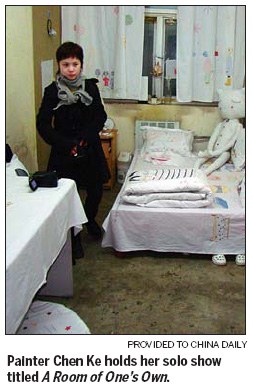
At 9:41 on a recent Sunday morning, the text message was sent: "Come to Fangyuan Xi Lu. Right of the Sunny Golden Market. Left of the U&D Jewelry. Underground 20A near Sculpting in Time Cafe. Call for assistance. Time: 2 to 6 pm."
The recipients of the message arrived one by one, sometimes in pairs or a few groups of three or so. They were led down stairs, through a maze of dimly lit corridors deep below Beijing's busy streets.
There they found a system of subterranean life unknown to most people who live in the city. Clotheslines, scattered shoes and small rooms rented by workers are evidence of a people who cannot afford to live on the surface - waiters, maids, security guards.
A door to one of the rooms was open. A bright light shone out and the small crowd of visitors gathered around, curiously peering inside. The space was filled with tiny squares of fabric, clothes, pillows and stuffed animals embroidered with pictures and phrases: "You have to be strong"; "Be strong, don't cry." A recording of footsteps played in the background.

If the scene seems more than slightly otherworldly, it isn't. It's art. More specifically, it's an art installation project aimed at showcasing work by emerging Chinese artists in unconventional locales -apartments, vacant stores and soon-to-be demolished hutong - around Beijing.
The project, called Open House, is organized by chART Contemporary, a Beijing-based curatorial lab focused on introducing Westerners to Chinese art as well as helping Western artists exhibit their works in China. It is the fourth site-specific installation the consultancy has produced.
"We want to make art an individual and a shared experience," said Megan Connolly, who founded chART Contemporary with her sister KC Vienna Connolly in 2008. "It is about bringing together art and people, not just art people."
The exhibit, held March 28, featured Chen Ke, a painter from Tongjiang county in Sichuan province. Titled A Room of One's Own, the installation embodied the experience of a young girl who moved to Beijing searching for economic and social prosperity.
The pictures and phrases on the pillows, clothes and other household objects in the room reflected the inner struggles of loneliness, isolation, hope and aspiration experienced by those who move to Chinese cities in search of better lives.
The space showcasing the work amplified the psyche expressed within it, bringing to life the inner emotions of an imaginary young woman. She is chasing her dreams yet is also vulnerable and alone in a tiny underground bedroom with a lone window with a view of a dark wall.
"It is a universal narrative," said Megan Connolly. "You can take something from it and apply it to your own life. It resonates within your soul."
At 6 pm the exhibit closed. A few hours later it would be dismantled, the door to the tiny bedroom shut. And a brief moment of art and life in Beijing was cemented into the memories of the exhibit's attendees, as intended.
The Connolly sisters say they are recruiting project proposals from artists for their next Open House, which they hope will be held in June. For more information, visit www.chartcontemporary.com